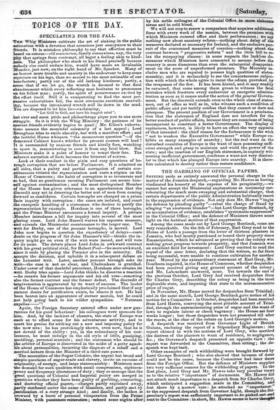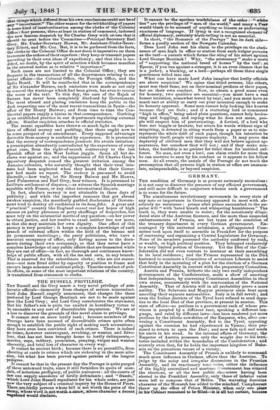THE GARBLING OF OFFICIAL PAPERS.
Somalia aside as entirely answered-the personal charge in the matter of the .Tamaica.despatch,—regarding Mr. Hawes as having vindicated his honesty at the expense of his perspicacity,—,we cannot but accept the Ministerial explanations as testimony cor- roborating the much more sweeping and substantial charge, that certain departments of the public Administration habitually resort to the suppression of evidence. Not only does Mr. Hawes "begin his defence by pleading guilty "—rebut the charge of fraud by alleging "an enormous blunder"—but Lord George Bentincksby an accumulation of evidence, establishes " systematic suppression' in the Colonial Office; and the defence of Ministers throws some light on the habitual motives of that suppression.
Among the cases made out by Lord George Bentinck, some are very remarkable. On the 8th of February, Earl Grey read to the House of Lords a passage from the letter of thirteen _planters in Jamaica, who had mostly purchased or leased their property since Emancipation, which he advanced as proving that the colony was making great progress towards prosperity, and that Jamaica was an excellent field for investment : Lord Grey omitted to read the sequel of the same letter, declaring that the writers, so far from being successful, were unable to continue cultivation for another year. Moved by the extraordinary statement of Earl Grey, Mr. Goulburn inquired, in the House of Commons, whether despatches had been received giving any general account of the colony ; and Mr. Labouchere answered, none. Yet towards the end of the previous October, Lord Grey had received despatches from Sir Charles Grey, describing the colony as being in the most deplorable state, and imputing that state to the unremunerative price of sugar. In November, Mr. Hume moved for despatches from Trinidad; and in the same month, Lord George.Bentaack_gave notice of his motion for a Committee : in October, despatches had been; received from Lord Harris, conveying the most pitiable, account of Trini- dad, through the uneemunerating price of sugar and the want of laws to regulate labour or check vagrancy : the House sat four weeks longer ; but those despatches were not presented till after the recess, at the dose of the debate on Lord George's motion,. A despatch was leceived from Governor Light of British Guiana, enclosing the report of a Stipendiary Magistrate: -the report chimed in with the notions of Lord Grey, who ascribed the distress of the planters to want of residence, to negligence, &c. ; the Governor's despatch presented an opposite View: the -report was forwarded to the Committee, then sitting ; the de- spatch was kept back.
Other examples of such withholding were brought forward by Lord George Bentinck ; who also showed that lateness of dates could not be the cause, because the Committee had later dates from the Foreign. Office. But the defence of Ministers supplies two very sufficient reasons for the withholding of papers. In the first place, Lord Grey and Mr. Hawes take very peculiar views as to the relative "importance" of documents. Mr. Hawes did not attach much importance to a despatch from Sir Charles Greys which anticipated a suggestion made in the Committee, and lost there by a narrow vote : he attached no " importance." to the suppressed despatch from Governor Light, though the sti- pendiary's report was sufficiently important to be picked out and sent to the Committee : in short, Mr. Hawes seems to have thought ,that things which differed from his own conclusions could not beef spy "importance." The other reason for the -withholding of papers ‘- is some kind of insubordination among the clerks of the Colonial 'Office : four persons, three at least in station of command, indorsed :the now famous despatch by Sir Charles Grey with orders that it _should be sent before the Committee—Principal-Secretary Earl terey, Mr. Under-Secretary Hawes, Mr. Assistant-Under-Secre- .tary Elliott, and Mr. Cox. But, it is to be gathered from the facts, the clerks in the Colonial-Office do not deem it imperative on them to execute the orders of their superiors : they keep or transmit papers according to their own ideas of expediency ; And that idea is mo- dified, no doubt, by the spirit of selection which- becomes manifest in the avowed notion as to relative "importance' 'Such cases are not limited to the Colonial Office; they are frequent in the transactions of all the departments relating to ex- ternal iiffitirs—the Colonial Office, the Foreign Office, and the India 'Board. It will be recollected that in the correspondence Of Sir Alexander Burnes, such omissions were made as not only 'to conceal the warnings which had been given, but even to reverse the sense of the text.. To this day, the case of the Rajah- of Sattara has never been completely disclosed by Government. The most absurd and glaring omissions keep the public in the dark respecting one,of the most recent transactions in Spain—the affair of Sir -Henry Bulwer ; and from time to time the Con- tinental papers supply a hiatus in that correspondence. Garbling is an established practice in our departments regulating external affairs. Similar suspicion attaches to official statistics.
The recent squabbles have thrown so much light on the prac- tices of official secrecy and garbling, that there ought now to be some prospect of an amendment. Every supposed advantage derivable from secrecy is confuted by experience. It is pretended that the secrecy of correspondence pendente lite avoids irritation : a presumption abundantly contradicted by the experience of every great case, from the right-of-search controversy to the last Spanish affair or this West Indian juggle. Spain all but de- dares war against us; and the suppression of Sir Charles Grey's expository despatch caused the greatest irritation among the Jamaica colonists, who naturally thought that their vital inte- rests had been neglected when they heard that their Gover- nor had made no report. The secrecy is presumed to avoid discredit,—how truly, let Sir Henry Bulwer and Mr. Hawes, Lord Palmerston and Earl Grey, bear witness. It is presumed to facilitate settlement of disputes,—as witness the Spanish marriage squabble with France, or any other international dispute. In fact, absolute secrecy is not attainable in these days of publicity ; and while the imperfect rumours that get abroad awaken suspicion, the manifestly garbled disclosures of Govern- ment tend to destroy all confidence in its bonajides. A great and "practical" country like England cannot rest her hopes of high success on paltry pretences or petty shuffiings of despatches, but must rely on the substantial merits of any question—on her power to obtain justice, and her resolve to exact neither less nor more, so that she may maintain her own dignity. One effect of this secrecy is.very peculiar : it keeps a complete knowledge of each -branch of external affairs within the hold of the bureau and its permanent underlings ; the party politicians, who have a transient -occupancy of office, only having access to the docu- ments during their own occupancy, so that they never have a complete knowledge of any public affairs that are transacted while they are out of office—in fact, no thorough and continuous-know- ledge of -public affairs, with all the ins and outs, in any branch. That is reserved for the subordinate clerks; who are not states- men—not men fitted either by capacity or position to frame and -execute large schemes of national policy. Thus the conduct of pub- -he affairs, in some of the most important relations of the country, is transferred from statesmen to clerks.



























 Previous page
Previous page